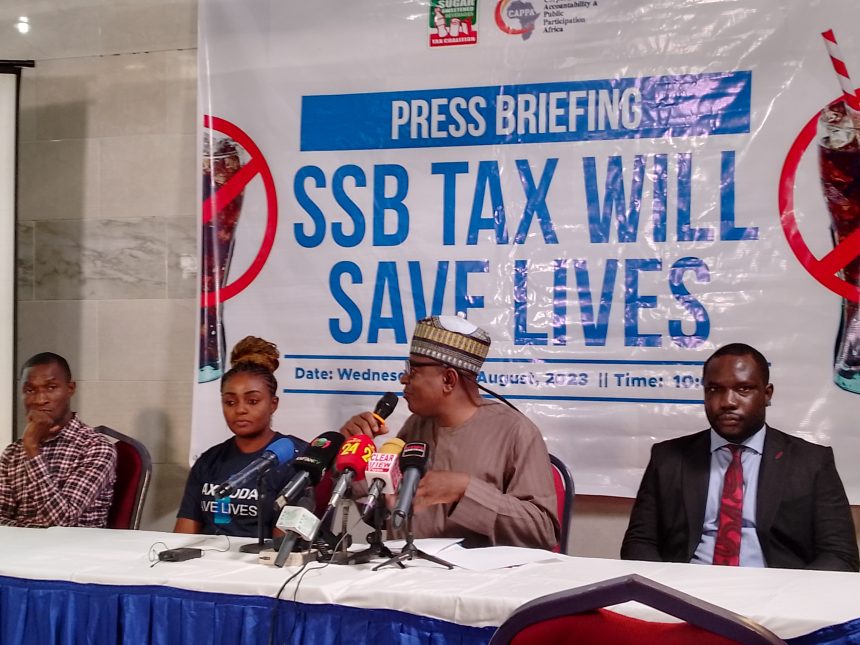(R-l) Dr. Francis Fagbule, Public Health Consultant, University College Hospital, Ibadan, Akinbode Oluwafemi, the Executive Director of CAPPA, Joy Amafah, Nigeria Coordinator, Food and Nutrition Programs, Global Health Advocacy Incubator (GHAI), and Austine Iraoya, Economic and Research Expert, Member of National Sugar Sweetened Beverages Tax Coalition during a Press Conference on effective taxing of SSBs in Abuja on Wednesday.
For Sugar Sweetened Beverage SSBs tax to be effective there is need for the Federal Government to review the tax upwards from N10 to 20% percent of the final retail price of the products, the Corporate Accountability and Public Participation Africa (CAPPA) has advocated.
Akinbode Oluwafemi, the Executive Director of CAPPA, disclosed this at a press conference tagged: ‘SSB Tax Will Save Lives’ organized by CAPPA in Abuja on Wednesday.
Oluwafemi briefed journalists in company of heads of other Non Governmental Organizations including, Joy Amafah, Nigeria Coordinator, Food and Nutrition Programs, Global Health Advocacy Incubator (GHAI), Dr. Francis Fagbule, Public Health Consultant, University College Hospital, Ibadan, and Austine Iraoya, Economic and Research Expert, Member of National Sugar Sweetened Beverages Tax Coalition among others.
The CAPPA boss recalled that federal government moved to reduce the overconsumption of SugarSweetened Beverages which have links to cancer, obesity, diabetes, and other non-communicable diseases (NCDs), and imposed a N10/Litre Excise Duty on SSBs in 2021.
He however noted that a N10/Litre Excise Duty on SSBs is insignificant and may never have the desired impact on consumption rate and by extension the nation’s healthcare sector, stressing that for any meaningful impact to be achieved, the tax must be immediately increased to a minimum of 20% of the final retail price of SSBs products.
According to him, government must not succumb to the blackmail of the producers of SSBs, instead, the they should begin a legislative process for the sustainability of the tax, that will be adjustable for inflation with provisions on earmarking, stressing that government’s role of protecting the populace remains sacrosanct and the current government must honor this social contract with the people.
Oluwafemi also urged government to ensure that other SSBs not captured in the current tax regime are all included, and in good faith begin to account for the taxes collected showing a breakdown of how it has been expended.
“As a coalition that has consulted across regions of the country, we state unequivocally that: The current #10/litre is insignificant, it has been absorbed by the industry.
“For the desired impact of reduction in consumption and decrease in NCDs, the tax must be immediately increase to a minimum of 20% of the final retail price of SSBs; government must not succumb to the blackmail of the producers of SSBs; Instead, the government should begin a legislative process for the sustainability of the tax, that will be adjustable for inflation with provisions on earmarking; Government’s role of protecting the populace remains sacrosanct and the current government must honor this social contract with the people; The government must ensure that other SSBs not captured in the current tax regime are all included; Government must in good faith begin to account for the taxes collected and a breakdown of how it has been expended” he said.
The CAPPA boss warned that ‘manufacturers of these unhealthy products through various front and ally groups including the Manufacturers Association of Nigeria, Organised Private Sector, and other nameless groups have continued to blackmail the government with their heavy media campaign of misinformation and threat to the federal government’.
In her remarks, Joy Amafah, Nigeria Coordinator, Food and Nutrition Programs, Global Health Advocacy Incubator (GHAI), said a lot of benefits could be derived from effective taxing of SSBs.
According to her, it drive behavioural changes, reduced the rate of which people come down with illnesses related to excess sugar consumption and by extension reduce the burden on the already overburdened healthcare system in the country.











